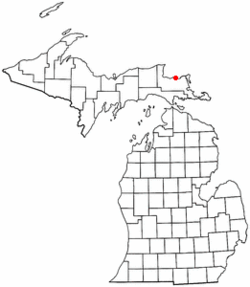Bay Mills Indian Community
| Bay Mills Indian Community | |||
|---|---|---|---|
| Reservation | |||
|
|||
 Location of Bay Mills Indian Community, Michigan |
|||
| Country | United States | ||
| State | Michigan | ||
| County | Chippewa County | ||
| Townships |
Bay Mills Township |
||
| Land purchased | 1937 | ||
| Government | |||
| • Governing body | General Tribal Council | ||
| Area | |||
| • Total | 4.793 sq mi (12.41 km2) | ||
| Population (2000) | |||
| • Total | 812 | ||
| Time zone | EST (UTC-5) | ||
| • Summer (DST) | EDT (UTC-4) | ||
| Website | Bay Mills Indian Community | ||
| Total area is divided into two separate parcels. Since 2000, the tribe has purchased an additional 3,494 acres (5.46 sq mi; 14.14 km²) | |||
Bay Mills Township
Sugar Island Township
The Bay Mills Indian Community (BMIC), known in Ojibwe as Gnoozhekaaning (Place of the Pike), is an Indian reservation forming the land base of one of the many Sault Ste. Marie bands of Chippewa (aka Ojibwa) Indians. The largest section of the reservation is located in Chippewa County, Michigan, approximately 15 miles (25 km) west-southwest of Sault Ste. Marie; it has land in both Bay Mills and Superior townships. A smaller section lies southeast of Sault Ste. Marie and encompasses Sugar Island, all contained within the Sugar Island Township.
The Ojibwa were a large tribe with numerous bands who occupied territory around the Great Lakes, particularly Lake Superior and Lake Michigan, in what are now Canada and the United States (where they have been known as Chippewa).
Numerous bands have historically occupied areas around Sault Ste. Marie, Michigan and Ontario, with the city long established during the colonial era as a French and then British fur trading post. This gradually developed as a settled community, cosmopolitan in its varied cultures. In the 19th century, the Ojibwa/Chippewa bands in Michigan were forced to cede large amounts of territory, and many bands became landless. They persisted in maintaining their cultural communities.
Bay Mills people are Ojibwa or Chippewa who have lived for hundreds of years around the Whitefish Bay, the falls of the St. Marys River and the bluffs overlooking Tahquamenon Bay, all on Lake Superior and southwest of Sault Ste. Marie. The Bay Mills Indian Community was officially established by an Act of Congress on June 19, 1860.
...
Wikipedia


